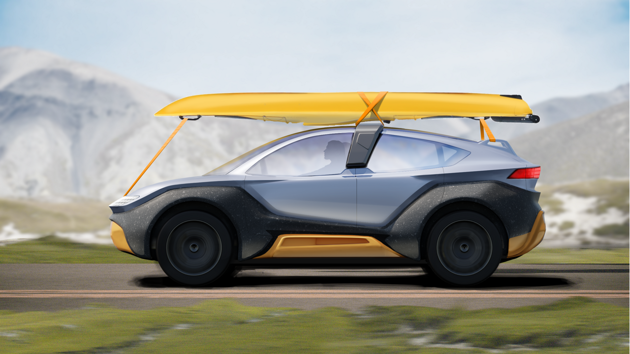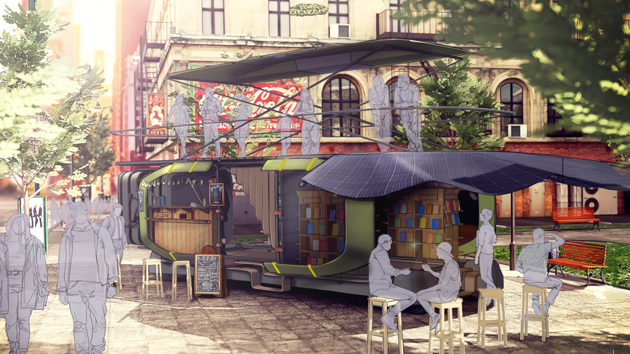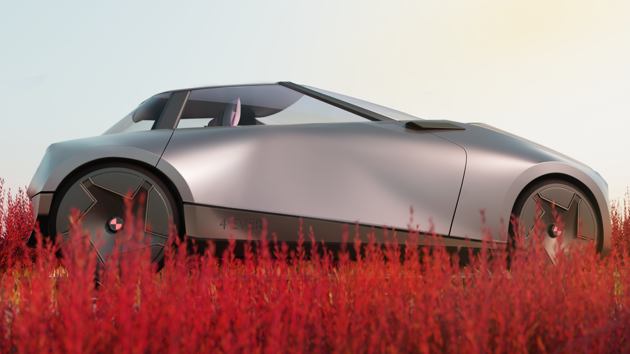
Course guide
All courses are structured into 5-, 10- or 20-week blocks. Within each block, shorter course modules offer specific skills training, theoretic studies and practical exercises. Studio courses are usually part of a 5-week block and aimed at learning specific skills and applying them in practical exercises.
What you'll cover
First year
1. Skills and Techniques (7.5 credits)
Students join the programme in the fall and are initially introduced to the basic tools that will be utilized during the study period. They are trained to handle the equipment found in the school's facilities and workshops. All new students develop their creative skills by doing intensive sketching exercises and also sculpting using materials like wood, wire, paper and clay.
2. CAID 1 & 2 (7.5 credits)
During the CAID courses students attend lessons on digital modeling where the state-of-the-art Autodesk Alias Automotive is taught. Preparation for rapid prototyping and visualization tools like Showcase & Keyshot are also covered.
3. Vehicle Concept Design (15 credits)
During this project our students must apply their previous knowledge to develop a complete vehicle (interior and exterior). Such exercise is normally implemented in collaboration with the industry and comprises further education about ergonomics, vehicle architecture and design methods.
These student projects should present a mix of conceptual ideas and detailed realistic design solutions that give credibility to their results. An external tutor is assigned to support the group of students during all phases of the project and the collaborating company is normally represented during the reviews.
4. Form in Transportation Design (7.5 credits)
As the course title implies our students focus on intensive form development during this block. Traditional and digital tools can be applied in the process.
5. Vehicle Design Analysis (7.5 credits)
The course provides theoretical and practical knowledge about the aspects that influence form in vehicle design. During the first module a combination of lectures, seminars and a written assignment provide knowledge and opportunity for reflection about factors that influence the configuration of a vehicle. Then, supported by instructor tutorials, students get familiar with the techniques involved in physical model-making using automotive clay as media.
6. Strategic Design (15 credits)
The course is structured in 2 modules, providing knowledge and practice on brand identity and strategic design. During the first three weeks of the course students learn how to analyze an existing brand and practice strategic design and innovation-driven tools that will support the creation of a design brief that is aligned to global sustainable development goals.
In response to the students own design brief, ideation phase begins and creative tools are used to generate a number of possible design proposals that will fulfill the aspired attributes of the vechicle concept. These alternatives are discussed and one is selected for further refinement in the process. Regular tutoring sessions and seminars support the students learning during this section.
Second year
7. Storytelling in Design (7.5 credits)
This course provides both theoretical and practical information related to visual storytelling used for conceptual design creation, visualisation and communication. It includes storytelling theory, movie editing and a creative project work.
8. Vehicle Interior Design (15 credits)
This project is normally carried out in collaboration with the industry. Students understand the importance of mapping real user needs in order to propose attractive, innovative and improved vehicle interior environments. The formal subjects included in the project are ergonomics, applied graphics, colours and materials.
9. Future Mobility (7.5 credits)
This 5-weeks course serves as preparation for the final thesis in the programme. The course include individual reflections about project themes, methods and the process of design in combination with the student's own design philosophy. It aims at exploring the potential of influencing and developing the work methods and process of design and thereby strengthen role of the professional industrial designer of the future.
Elective track: Practice in Transportation Design (30 credits)
The elective course runs as an alternative to courses 7,8 and 9. It is structured in 3 sections in which contemporary practice and work-related situations are explored by the understanding, analyses, discussions and experience from practical participation in professional design contexts.
Practical experience is critically compared to design theory and students reflect upon their observations during the period. Remote tutoring and checkpoints support the creation of a written report for submission at the end of the course. Supervision based on written assignments guides the student in the process of creating a proposal for a thesis project in the Transportation Design Programme.
10. Degree Project (30 credits)
The final core project in this program runs for 20 weeks and is a self-directed investigation into an area of your choosing. This project is normally done in cooperation with a corporate sponsor or external partner, established on the initiative of the student.
You are expected to identify design opportunities, establish contact with stakeholders and write a project brief which includes project goals, description of methods, anticipated deliverables and outline budget.
The process of defining the projects starts early in the third semester and is done in dialogue with the Programme Director. You will receive tutoring support throughout the project, with regular checkpoints to assess your progress. Your final results will be exhibited at annual graduation event.

Student Work – Vehicle Concept Design
Explore student projects from the 'Vehicle Concept Design' course.

Student Work – Strategic Design
Discover projects created by students in the ‘Strategic Design’ course.

Student Work – Degree projects
View the innovative degree projects from our transportation design students.
Latest update: 2024-08-22